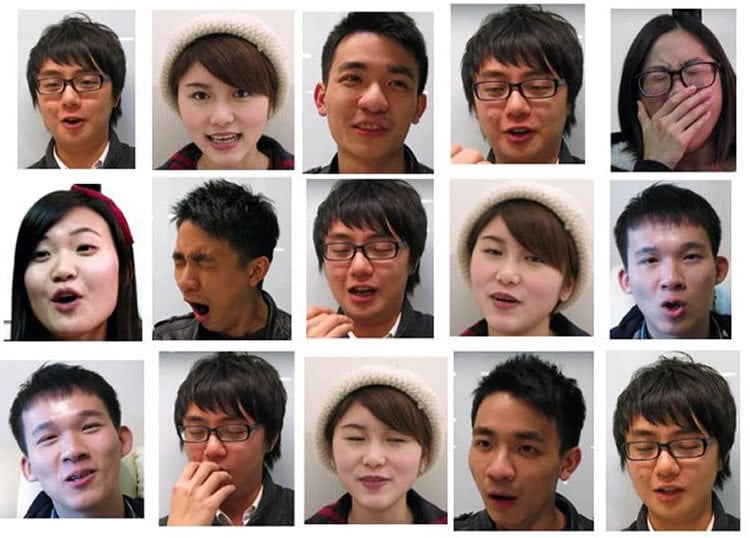Summary: Perceptual ability is more closely related to contagious yawning than empathy, researchers find.
Source: Tohoku University.
Contagious yawning is a universal phenomenon, but why it happens remains a mystery.
A new study out of Tohoku University suggests that contrary to common belief that the yawning contagion is associated with empathy, it is in fact, more likely that perceptual sensitivity is to blame.
In the study, healthy volunteers were shown photos and videos of people yawning. The intention was to induce contagious yawning. The participants were observed through hidden cameras, which recorded their reactions, and an eye-tracking machine, which registered their gazing patterns.
To test the participants’ sensitivity towards yawning expressions, they were later given 60 photos containing four intensity levels of yawning, and asked to judge (yes/no) if the person in each photo was yawning.
For control comparisons, participants were also shown 60 happy and 60 angry photos with four intensity levels, after which they were asked if the people in the photos looked happy/angry.
Researchers found that those who were more likely to detect yawning from a face were also more likely to be induced to yawn. However, sensitivity to happy or angry faces appeared to have little relation to the frequency of contagious yawning.
To study whether contagious yawning relates to empathy in healthy people, the participants’ autistic tendency (or AQ, autistic quotient measured by an autism-spectrum quotient questionnaire) was measured but showed little effect. However, female participants in the study registered a significantly higher susceptibility towards catching a yawn contagiously.

The study, titled “Yawning Detection Sensitivity and Yawning Contagion” was published in i-Perception on August 25, 2017. It is the first study to investigate the perceptual limitations on yawning contagion behavior in a non-clinical population.
“Recent clinical observations showed that individuals diagnosed with Autism or Schizophrenia did not yawn contagiously like typical individuals. This has led many to think that impaired social ability (e.g. empathy) might contribute to a person’s inability to yawn contagiously,” said lead researcher, Dr. Chia-huei Tseng, an associate professor at the Research Institute of Electrical Communication (RIEC) at Tohoku University. However, it is unknown if the clinical speculations also apply to the general population.
“We find that for non-clinical population, perceptual ability is more closely related to contagious yawning than empathy is,” said Tseng. “Since it’s been documented that people with autism tend to suffer from impaired perception such as an atypical eye gazing on faces and a difficulty in judging facial emotions, it’s possible that their perceptual limitation causes them to be unable to detect someone else’s yawning expression. This is a possible explanation for their lack of contagious yawning. ”
Funding: This research was done in collaboration with Meingold Chan from Cambridge University (now at Ohio State University), and is supported by RIEC’s Cooperative Research Project Program and the Tohoku University Center for Gender Equality Promotion (TUMUG).
Source: Chia-huei Tseng – Tohoku University
Image Source: NeuroscienceNews.com image is credited to the researchers.
Original Research: Full open access research for “Yawning Detection Sensitivity and Yawning Contagion” by Meingold H. M. Chan and Chia-Huei Tseng in i-Perception. Published online August 25 2017 doi:10.1177/2041669517726797
[cbtabs][cbtab title=”MLA”]Tohoku University “Contagious Yawning More Closely Associated With Perceptual Sensitivity Than Empathy.” NeuroscienceNews. NeuroscienceNews, 5 September 2017.
<https://neurosciencenews.com/contagious-yawning-perceptual-sensitivity-7415/>.[/cbtab][cbtab title=”APA”]Tohoku University (2017, September 5). Contagious Yawning More Closely Associated With Perceptual Sensitivity Than Empathy. NeuroscienceNew. Retrieved September 5, 2017 from https://neurosciencenews.com/contagious-yawning-perceptual-sensitivity-7415/[/cbtab][cbtab title=”Chicago”]Tohoku University “Contagious Yawning More Closely Associated With Perceptual Sensitivity Than Empathy.” https://neurosciencenews.com/contagious-yawning-perceptual-sensitivity-7415/ (accessed September 5, 2017).[/cbtab][/cbtabs]
Abstract
Yawning Detection Sensitivity and Yawning Contagion
Contagious yawning—the urge to yawn when thinking about, listening to, or viewing yawning—is a well-documented phenomenon in humans and animals. The reduced yawn contagion observed in the autistic population suggested that it might be empathy related; however, it is unknown whether such a connection applies to nonclinical populations. We examined influences from both empathy (i.e., autistic traits) and nonempathy factors (i.e., individuals’ perceptual detection sensitivity to yawning, happy, and angry faces) on 41 nonclinical adults. We induced contagious yawning with a 5-minute video and 20 yawning photo stimuli. In addition, we measured participants’ autistic traits (with the autism-spectrum quotient questionnaire), eye gaze patterns, and their perceptual thresholds to detect yawning and emotion in human face photos. We found two factors associated with yawning contagion: (a) those more sensitive to detect yawning, but not other emotional expressions, displayed more contagious yawning than those less sensitive to yawning expressions, and (b) female participants exhibited significantly more contagious yawning than male participants. We did not find an association between autistic trait and contagious yawning. Our study offers a working hypothesis for future studies, in that perceptual encoding of yawning interacts with susceptibility to contagious yawning.
“Yawning Detection Sensitivity and Yawning Contagion” by Meingold H. M. Chan and Chia-Huei Tseng in i-Perception. Published online August 25 2017 doi:10.1177/2041669517726797






